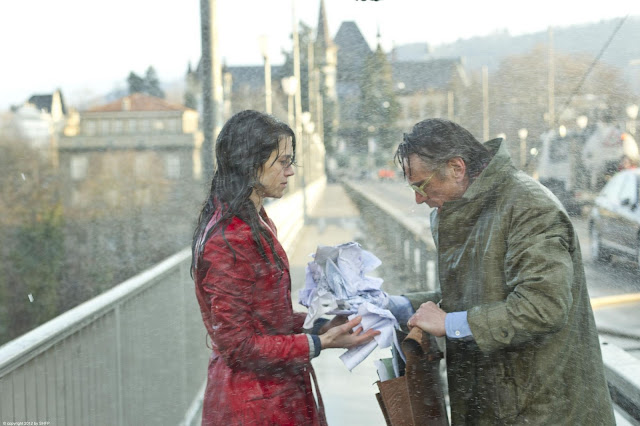The real
director of our life is accident. So wrote
the physician/philosopher/poet/revolutionary in Night
Train to Lisbon.
I
haven't given the concept enough thought to feel comfortable offering
an opinion on it, but I can say it was most likely a series of
accidents that guided me to read Night
Train to Lisbon,
among the first being I didn't read any of the reviews,
which probably would have persuaded me to pass it up. I include the
film adaptation's belittling reviews, which might have nixed my
borrowing the DVD from the public library.
As
luck would have it I'd already packed my laptop and was browsing the
DVD section hoping to find The
Constant Gardener
to watch that night. I’d just finished posting a review
of the
novel on my blog and wanted to see the movie again. Alas, our library
doesn’t have it (they’ve ordered it on Inter Library Loan for me,
which means it could come from Kenya or Timbuktu and I’d have to
pay the postage on it, but I’m gambling a nearer copy will be
found, the thrill of risk being a large part of the fun, you see).
Meanwhile, as our librarians were busy processing the ILL order form,
I, having worked myself into a mood to watch a video that night
nonetheless, returned to the DVD section in search of something that
looked palatable. After clacking through dozens of plastic cases
protecting the likes of Adam Sandler originals and James Patterson
adaptations I came upon Night
Train to Lisbon.
Knowing nothing about it but sensing from the title it might reach at
least a tad beyond the predictable dialogue,
firefights, and demolition derbies favored by the eternal-child
American movie market, and seeing the sophisticated image of Jeremy
Irons on the cover, I gambled once more and took it home.
And I liked it. Liked it so
much that I went on and read the book. I liked that, too, although I
must admit I’m glad I watched the movie first. Starting at the
novel, with its sprawling, turgid, endlessly voluble quasi-plot, I’d
have been hard pressed to suggest how a film adaptation was feasible.
The adaptation was magical, I see now in retrospect. Still a lot of
talking (although it’s no My Dinner with Andre),
but the story’s cohesive, with smart changes that give form to the
novel’s hodgepodge of meanderings, internal musings and
dreams—annoying, frequent dreams that arrive with little or no
warning and require renewed concentration and rereads to realize
they’re dreams. Perhaps the intent was poetic, but whatever it was
it slows the narrative down even more than the tedious repetitions of
the already slow-going philosophical assertions that are really what
this novel is all about.
Liesl
Schillinger’s merciless review in the New York Times puts it this
way:
the
“wording is so dense and overwrought, and Barbara Harshav’s
translation [from
German] so ham-handed,
that unpacking each sentence is like decoding a cryptic crossword in
hieroglyphs.” Needlessly
harsh. A tad over the
top, but in keeping
with the generally disparaging tone of other stateside
reviews. European reviewers loved the novel, written by Swiss
philosopher Peter Bieri under the pseudonym Pascal
Mercier.
In
the U.K.’s The Telegraph Daniel
Johnson describes Night
Train, “a novel
of ideas that reads like a thriller:
an unsentimental journey that seems to transcend time and space.
Every character, every scene, is evoked with an incomparable economy
and a tragic nobility redolent of the mysterious hero, whom we only
ever encounter through the eyes of others.” Johnson concludes that
Mercier “now takes his rightful place among our finest European
novelists.” Okay, that’s a tad over the top in the other
direction, yet, because of the ideas explored in the narrative, and
maybe also because of the movie, I leaned more toward the positive
view.
I’ll get to the plot in a
jiffy, but first a couple of the ideas I found worthy of pondering.
Just one, as I already gave you one at the start. How about this:
“It
is a mistake to believe that the crucial moments of a life when its
habitual direction changes forever must be loud and shrill dramatics,
washed away by fierce internal surges. This is a kitschy fairy tale
started by boozing journalists, flashbulb-seeking filmmakers and
authors whose minds look like tabloids. In truth, the dramatics of a
life-determining experience are often unbelievably soft. It has so
little akin to the bang, the flash, or the volcanic eruption that, at
the moment it is made, the experience is often not even noticed. When
it deploys its revolutionary effect and plunges a life into a
brand-new light giving it a brand-new melody, it does that silently
and in this wonderful silence resides its special nobility.”
I
spent a little time pondering after I read that one, probably got up
to stretch my legs, drink some water, visit the lavatory (as I
believe they say somewhere in the U.K.), and maybe even take
a nap. There were many others. Slowed down the reading some, but gave
me chunks of savory food for thought. An Army buddy once asked me,
What happens to the garbage of food for thought? I laughed, but I
still wonder about it. Maybe it’s recycled in an insouciant book
review.
The
plot. Okay, here’s the plot (I shall rely on the film version, as
it makes more sense than the novel’s despite critics' seemingly
universal dismissal of it because it didn’t thrill them the
way
popular movies must
thrill the youth of our frightening world these
days.
A
New York Times
critic—possibly himself a teenage intern—decried the lack of
“action” in flashback scenes of the resistance to Portugal’s
dictator,
Antonio Salazar. Perhaps the “reviewer” was staring at his
idiotphone and missed the scene where Salazar’s secret police smash
with a hammer the hands of a pianist they’re interrogating, ho
hum).
Really
fairly simple, the plot. And the acting is first-rate. Jeremy Irons
is perfect as stuffy, divorced, middle-aged classics teacher Raimond
Gregorius, who tackles a young woman and pulls her to safety from the
rail of a bridge where it appeared she was preparing to jump. The
city is Bern, Switzerland, and Gregorius is walking to work on a
rainy morning when this “accidental” encounter takes place. The
woman follows him to the school and into his classroom. She sits
awhile, then gets up, holds her finger to her lips and slips out the
door, leaving her dripping coat hanging on a hook. Gregorius steps to
the window and watches her walk away. Without explanation to his
students he immediately grabs the woman’s coat and deserts the
classroom, but when he gets outside, she’s gone.
 |
| Bieri/Mercier naps while pondering a philosophical notion? |
In
the pocket of her coat he finds a book titled A
Goldsmith of Words,
written by the Portugese physician/philosopher/poet/revolutionary
whose quote I served as an hors
d’oeuvre up
top (first sentence, in fact). He reads some of the golden words and
uses a train ticket to Lisbon (that was also in the coat pocket) to try to find the author, Amadeu
Inacio de Almeida Prado. He
amazes himself with the abruptness of his decision not to return to
the school where he’s taught for some thirty years and is a highly
regarded faculty member. Although he’d given it little thought, and
felt ambivalent about the choice, he knew
that for the first time in his fifty-seven years he was making a
life-changing decision.
In
Lisbon he soon learns Prado is long dead of an aneurysm, but
Gregorius tracks down people who knew the author, including his two
sisters, a couple of unusual girlfriends, and several people who knew him in
their resistance against the Salazar regime. Gregorius even finds a
hint of romance with a woman who tells him, unlike his ex-wife, she
does not find him boring.
Leaning on the film version, I've strayed somewhat from the book’s plot, but the conclusions are so
different, I’ll leave out the film ending, though preferable to the perhaps
post-post modern one in the book, so as not to spoil the more satisfying (to me) ending for those considering watching the movie first. In the book, Gregorius eventually returns to
Bern, where a friend has scheduled a diagnostic appointment for him
because of the severe dizzy spells he first experienced in
Lisbon--the same symptoms the long dead Prado had suffered before his
aneurysm burst and left him dead on a Lisbon street. We leave
Gregorius as he steps into the clinic and the door closes behind him.
Here’s
an encore philosophical quote from The
Goldsmith of Words
(you deserve it for putting up with this review
to
the bitter end):
“The
mind is a charming arena of self-deception, woven of beautiful,
soothing words that give us the illusion that we have an unerring
familiarity with ourselves, a closeness of discerning that shields us
from being surprised by ourselves. How boring it would be to live in
such effortless self-knowledge!”
[For
more Friday's Forgotten Books check the links on Patti
Abbott's unforgettable blog]

















